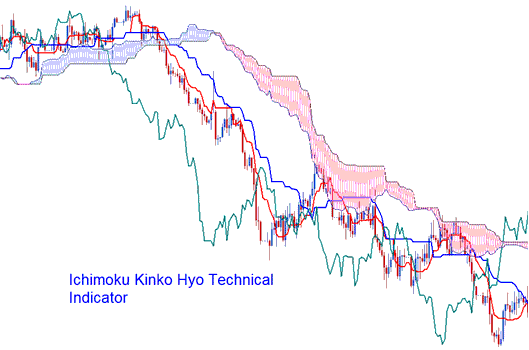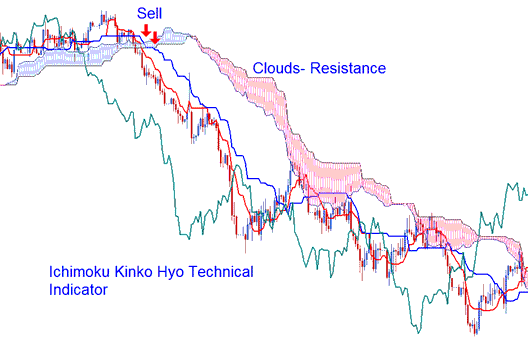Ichimoku Kinko Hyo Indicator
Ichimoku Kinko Hyo is a Japanese charting technique that was developed before by a Japanese newspaper writer, with the pen name of Ichimoku Sanjin.
- Ichimoku means 'a glance' or 'one look'
- Kinko means 'equilibrium' or 'balance'
- Hyo is the Japanese word for "chart"
Thus, Ichimoku Kinko Hyo means, 'a glance at an equilibrium chart'. Ichimoku attempts to identify the likely direction of price and help the trader to figure out the most suitable time to enter or exit the market.

Calculation
This indicator consists of five lines plotted using the midpoints of previous highs and lows. The five lines are calculated as follows:
1) Tenkan-Sen: Conversion Line: Red Line (Highest High + Lowest Low) / 2, for last 9 price periods
2) The Kijun-Sen: Base Line: Blue Line (Highest High + Lowest Low) / 2, for last 26 price periods
3) Chikou Span: Lagging Span: Green Line Today's closing price plotted 26 price periods behind
4) The Senkou Span A: Leading Span A = (Tenkan-Sen + Kijun-Sen) / 2, plotted 26 price periods ahead
5) Senkou Span B: Leading Span B: (Highest High + Lowest Low) / 2, for the past 52 price periods, plotted 26 price periods ahead
Kumo: Cloud: area between Senkou Span A and B
Forex Technical Analysis & How to Generate Signals
Bullish signal - Tenkan-Sen crosses Kijun-Sen from below.
Bearish signal - Tenkan-Sen crosses Kijun-Sen from above.
However, there are different areas of strength for the buy & sell signals generated.

Technical Analysis in FX Trading
Bullish cross-over signal occurs above the Kumo (clouds),
Very strong buy signal.
Bearish crossover signal occurs below the Kumo (clouds),
Very strong sell signal.
If a bullish/ bearish crossover trading signal takes place within the Kumo (clouds) it's considered a medium strength buy or sell signal.
A bullish crossover that occurs below the clouds is considered a weak buy signal while a bearish cross-over that occurs above the clouds is considered a weak sell signal.
Support and Resistance Areas
Support and resistance levels can be predicted by the presence of Kumo (clouds). The Kumo can also be used to identify the current trend of the forex trading market.
- If price is above the Kumo, the prevailing market trend is said to be upwards.
- If price is below the Kumo, the prevailing market trend is said to be downwards.
The Chikou Span or Lagging Span is also used to determine the strength of the buy or sell signal.
- If the Chikou Span is below the closing price of the last 26 periods ago and a sell short signal is given, then the strength of the Forex trend is downwards, otherwise the signal is considered to be a weak sell signal.
- If there is a bullish signal and the Chikou Span is above the price of the last 26 periods ago, then the strength of the trend is to the upside, otherwise it is considered to be a weak buy signal.
